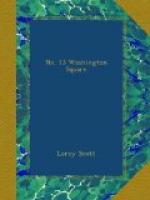“Of course,” said she with her mechanical composure.
“Or if there is any difficulty,” he continued, desirous of making peace, “I shall be glad to arrange a loan for you.”
She was too blinded by disaster to think, to realize her needs. And dazed though she was by this reverse, her anger against Judge Harvey for daring to criticize burned as high as before. And then, too, she remembered the haughtiness with which she had just refused his advice and put him in his place. At that moment, the person of all persons in the world from whom it would have been most humiliating to her to accept even a finger’s turn of assistance was Judge Harvey.
“Thank you. I shall manage very well.”
“And the Newport house?”
“I shall send you my instructions concerning it later.”
He hesitated, waiting for her to speak. But she did not.
“Then that is all?” he queried.
“Quite all,” she replied.
He still lingered. He was not to see her again for three months. And he didn’t like to part like this; even if—
“After all, Caroline,” he said impulsively, holding out his hand, “let’s forget what we said and be friends. At any rate, I certainly hope you have a most enjoyable time in Europe.”
“Thank you. I am sure I shall have.”
Her words were cool, calm; the hand she gave him was without pressure. Stiffening again, he made her the briefest of bows and angrily walked out.
At the sound of the closing door, announcing that Judge Harvey’s eyes were outside the room, Mrs. De Peyster unloosed the mantle of dignity, which with so great an effort she had kept folded about her person, let her face fall forward into her hands, and slumped down into her chair, a loose, inert bundle. Several lifeless minutes dragged by.
A little before, during a silence between Judge Harvey and Mrs. De Peyster, the study door had slowly opened and there had appeared the reconnoitering face of the entrapped Mr. Bradford. Though their attention had apparently been too centered on each other for them to be observant of what happened beyond their very contracted horizon, that had seemed to him no promising moment to try for an escape. With high curiosity, eyes amused and alight with delectable danger, he had studied Judge Harvey a moment, and then the duchess-like Mrs. De Peyster in her most magnificent towering attitude of wrathful hauteur. Then quickly and soundlessly the heavy door had closed.
Now again the heavy, sound-proof door of the study began to open—noiselessly, inch by inch. Again the light, humorous, but shrewd, very shrewd, face of Mr. Bradford appeared in the crack. This time the face did not withdraw. He watched the bowed figure of the solitary Mrs. De Peyster for several moments; considered; measured the distance to the door of escape; evaluated the silencing quality of the deep library rug; then slipped through the door, closed it, and with tread as soft as a bird’s wing against the air started across the room.




